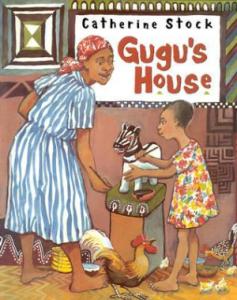And I wonder, still I wonder, who'll stop the rain? Before it destroys my house, I mean.

A little girl who lives in Africa is going to her grandmother's house. Her grandmother's name is Gugu and the little girl's name is Kukamba. It's unclear where the girl lives most of the time. Her grandmother has a bunch of sculptures all around her house. Apparently they're made out of mud and dung. In the morning, the men of the village set off to graze their livestock, and the women right tend their crops. The girl and her grandmother stay and do various chores like feeding chickens and getting water and things like that, and then they work on the house. They paint the house and sculpt things. (So much stuff made out of dung... it's kind of disturbing, but that's cultural differences for you.)
The rains are late and all the people are upset because there's not enough water for the crops and for the livestock, and everybody in the village sits around a fire at night. Gugu tells a story and cheers everybody up, and then water comes one night and everybody's happy because there's finally water, but the water actually starts messing up all the walls and stuff in Gugu's house and melts the sculptures and washes away all the paint and things like that. Kukamba's like, "What has happened to all the beautiful colors? There's only brown mud everywhere!" And Gugu points out at the surrounding environment and how all these flowers are blooming and there's animals, finally, now that the rain has come. And then they go rebuild the house. I guess it's a thing that happens on a recurring basis, this house rebuilding.
The author's note at the end says that Gugu is based on a real woman who lives in Zimbabwe who has a house that's painted and everything, and every year in that area of Zimbabwe near the Limpopo River when the rains finally come, the natural world just goes crazy with life, and also starts washing away this woman's house and sculptures.
I think the message of the story is about the cyclical aspect of nature and how things must be washed away in order to come anew but it's a bit confusing. I mean, clearly if this woman is in the modern world (on one of the first pages of the book, there's an image of a bus driving Kukamba to go visit Gugu so it pretty clearly takes place in the modern world), if she wanted to, she could actually make more permanent sculptures. But she clearly doesn't, so she likes some part of the destruction and the renewal. I don't know, it's kind of like chalk pavement art: it's supposed to be temporary. It's not really my thing, but it's not bad. I wouldn't say there's an awesome message to get out of it, but it's a pretty good book. As far as I can tell, it treats the Zimbabwe culture and the specific person that this is based on rather respectfully.